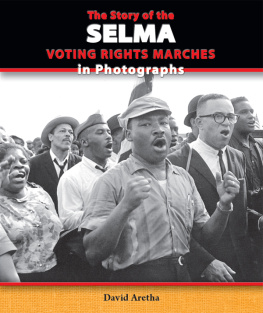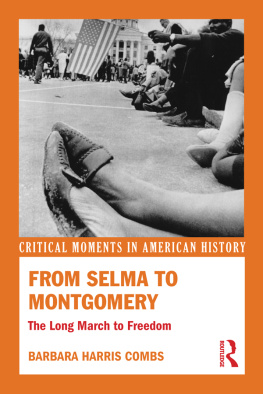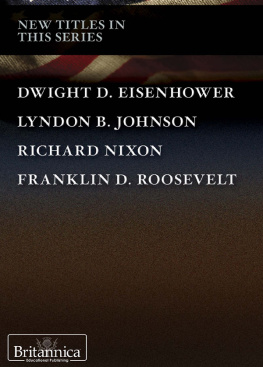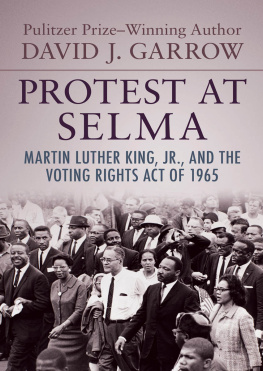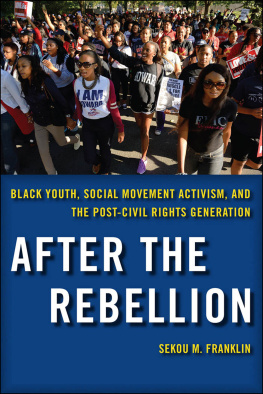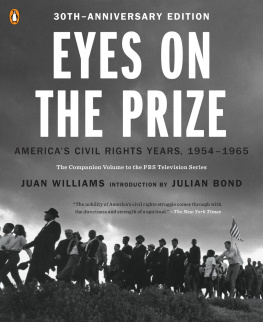The Music Has Gone Out of the Movement
2009 THE UNIVERSITY OF NORTH CAROLINA PRESS
All rights reserved
Designed by Michelle Coppedge
Set in Electra with Grotesque display by Rebecca Evans
Manufactured in the United States of America
The paper in this book meets the guidelines for permanence and durability of the Committee on Production Guidelines for Book Longevity of the Council on Library Resources.
The University of North Carolina Press has been a member
of the Green Press Initiative since 2003.
Library of Congress Cataloging-in-Publication Data
Carter, David C. (David Charles), 1970
The music has gone out of the movement : civil rights and the
Johnson administration, 1965-1968 / David C. Carter.1st ed.
p. cm.
Includes bibliographical references and index.
ISBN 978-0-8078-3280-6 (cloth : alk. paper)
ISBN 978-1-4696-2200-2 (pbk. : alk. paper)
1. African AmericansCivil rightsHistory20th century.
2. Civil rights movementsUnited StatesHistory20th century.
3. United StatesPolitics and government1963-1969. I. Title.
E185.615.C3517 2009
323.119607309046dc22
2009004945
cloth 13 12 11 10 09 5 4 3 2 1
paper 18 17 16 15 14 5 4 3 2 1
FOR LESLIE,
sweet descant to
my emancipated
dissonance
&
FOR MY PARENTS,
in the mountains,
from whence cometh
my help
Contents
Text Abbreviations
Illustrations
Lyndon Johnson at Howard University on June 4, 1965
The audience at the Howard commencement
The president and the crowd
LBJ with civil rights leaders
Members of the Big Six meet with the president in 1964
Vice President Hubert Humphrey with civil rights leaders
White backlash becomes a nationwide phenomenon
Martin Luther King Jr. and the president
Roy Wilkins and Lyndon Johnson
Kings growing opposition to the Vietnam War
Lion in the Streets
The Newark riot
The establishment of the Kerner Commission
LBJ political rival John Lindsay
Lyndon Johnson addresses the nation on March 31, 1968
Rioting comes to Washington, D.C.
Soul Brother
Preface
On March 15, 1965, Lyndon Baines Johnson addressed a Joint Session of Congress to call for federally enforced voting rights legislation. He spoke just eight days after Bloody Sunday, when Alabama state troopers, local law enforcement officials, and deputized white supremacists had brutally attacked African Americans on Selmas Edmund Pettus Bridge as they peacefully marched for voting rights. There is no Negro problem, the president insisted in the nationally televised speech. There is no Southern problem. There is no Northern problem. There is only an American problem. In evoking Gunnar Myrdals 1944 characterization of race as an American dilemma, Johnson sought to forge a national consensus on the need to eliminate discrimination at the ballot box.
Three months later, in a June 4, 1965, address at historically black Howard University, the president challenged the nation to confront the interwoven problems of poverty and discrimination that still hobbled black Americaanother nation. Lyndon Johnsons rhetoric committed his administration to an expanded definition of equality that promised equal results rather than simply equal opportunity. In the aftermath of the Selma beatings, Johnsons insistence that race was a national issue had seemed designed to soften the sense of regional persecution felt by many white southerners who were well aware that their region would be disproportionately affected by his call for voting rights legislation. If black Americans shared Johnsons view that racism was a national issue, however, most white Americans living north of the Mason-Dixon Line in the spring of 1965 still saw the dilemma of race as a southern problem.
Delivered during the months that are often seen as the high-water mark of the civil rights movementand of the Johnson administrationthe speech at Howard read differently in the aftermath of the Watts riots in August 1965 and during subsequent outbreaks of urban unrest. Despite several riots the previous summer in depressed inner-city neighborhoods, not until the urban explosion in the Watts area of Los Angeles did most whites appear ready to accept the presidents argument that race was fundamentally an American problem.
It is not clear whether Johnson initially grasped the most far-reaching implications of the Howard speechs lofty rhetoric. Nor could he have foreseen the ways in which the nations growing military involvement in Southeast Asia would complicate the domestic political landscape and jeopardize once-close relationships with increasingly impatient blacksand with erstwhile progressive white allies as well. As controversies surrounding the presidents War on Poverty grew and the political fallout increased in the North as well as in the South, a beleaguered president had to face a grim succession of riots in some of the nations largest cities. Publicly he reacted with moderation. Privately he complained that the ingratitude of rioters threatened to unravel the liberal consensus so essential to his ambitious domestic programs, and he could not fully shake his suspicions that the incendiary rhetoric of emerging black radical voices was evidence of a sinister conspiracy.
Despite such tensions and frustrations, the administration did not completely disengage from its civil rights agenda after 1965. In his Howard University speech, the president had sought to leapfrog the black freedom struggle and call the tune of racial reform by outlining an ambitious program of civil rights and antipoverty measures. The powerful Texans vision of mastery and control was always an illusion, however, for local people continued to make their own history. As grassroots movements and their antagonists forced the Johnson administration to respond to events rather than dictate policy, new, if sometimes fractious, relationships and pressures shaped the history of the period in unpredictable ways.
This book builds on the work of those committed to understanding African Americans struggles for equality as part of a long civil rights movement, which began well before the Supreme Courts 1954 Brown v. Board of Education landmark school desegregation ruling and which continued even through the years of white backlash and ascendant national conservatism.
In contrast to the rich outpouring of studies of the civil rights movement from its earliest origins to its high tide in the first half of the 1960s, the years after 1965 have attracted far less scrutiny. I have tried to tell what I believe is a neglected story of the interactions between the local and the national during the last three years of the Johnson presidency, tracing the trajectory of executive- and bureaucratic-level actionand inactionwhile also emphasizing the importance of the grass roots.
Mississippi offers a compelling example of these interactions, demonstrating how grassroots politics shaped competing outlooks on civil rights at the local, state, and national levels. That states central role in shaping White House understandings of voting rights between 1961 and 1965 has too often been overshadowed by the drama in neighboring Alabama, with its climax in Selma in the spring of 1965. Keeping the focus on Mississippi, I argue that the federal governments shifting responses to the controversial Child Development Group of Mississippi (CDGM) and other antipoverty programs perceived to be left of center in and after 1965 illuminate the links between Johnsons civil rights and economic justice policies.


